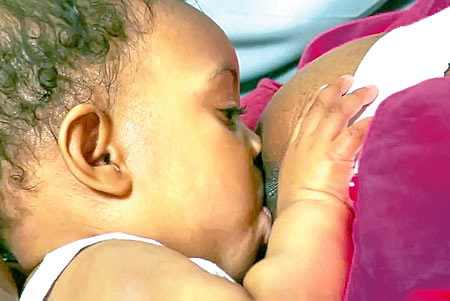Besides the fundamental role of breastfeeding in newborn’s nutrition, its other benefits for both mother and baby are countless and just more than a blessing. It not only provide physical nutrition but also the strong basis of bonding between mother and baby.
Just like countless blessings of breastfeeding, there are also countless myths related to breastfeeding circulating among mothers related to food intake with various health issues in baby. Mothers still believe in avoidance of some foods in their diet to avoid problems in a baby like colic, constipation and pneumonia.
The majority of mothers correlate hard food with constipation among babies. The leafy vegetable is presumed to cause the baby to have gas. Some nursing mothers prefer to take more fluid to produce more milk.
But the fact is that such foods have no impact on the alteration of breast milk composition which can cause colic or constipation- like problems in babies. They related it with the fact that whatever mother’s takes and whatever she has in her body are directly transmitted by breast milk into the baby.
But Professor Orimadegun, a consultant paediatrician at the University College Hospital (UCH), Ibadan, says that women do not need to avoid specific foods while breastfeeding to avoid problems in the baby like colic, constipation and pneumonia.
According to him, “Any food taken in by the mother goes into the mother’s digestive tract to be broken down. The raw food does not get into the breast for the baby to suckle, not at all. It is the food broken down, utilised by the mother that the body will use to form breast milk.
“It is not the bread or rice that will get into the baby, so rather, it is the mother that can develop constipation, not the baby. What usually causes constipation for breastfeeding babies is if the baby is not given sufficient time to suckle.”
He declared that if a baby has constipation in the real sense of it, paediatricians will want to find out why this is so because, in infancy, a baby that is well breastfed should not have what is medically termed constipation.
Constipation, he said, is the inability of a baby to pass stool for more than three days or the passage of hard stool. Its symptoms in babies may include being excessively fussy, crying for prolonged periods, refusing to feed, having a hard, distended belly, having rectal bleeding, passing hard or bloody stools and crying during a bowel movement.
According to him: “A baby that is exclusively breastfed at infancy can also do without passing stool for up to five days. It just simply implies that the baby is utilising breast milk very well. Breast milk gets completely absorbed during the process of digestion. Breast milk leaves minimal solid waste to pass through the digestive tract.
“We become worried if the baby is not passing stool beyond five days and the stomach is distended at infancy when a child is exclusively breastfed. If the abdomen is flat, there is no problem, particularly in exclusively breastfed babies.
“By the time, complementary feed is introduced after six months, constipation might occur however around that time because of the way some mothers prepare their meals. But as every baby passes faeces on their schedule, the frequency of bowel movements is not always an accurate indicator of constipation. Neither is seeing the baby grunt or strain while having a movement.”
Moreover, constipation in breastfed infants could be a symptom of a milk protein allergy or even as a result of a birth defect present at birth.
According to the Centers for Disease Control and Prevention (CDC), women do not need to avoid specific foods while breastfeeding. But babies may appear to avoid feeding after a woman eats a particular food. In this case, the woman may wish to refrain from eating that food for a while and reintroduce it later.
A 2018 study examined the bowel habits of 83,019 newborn babies in Japan. According to the authors, most instances of constipation coincided with the transition from breastfeeding to infant formula, regardless of whether the woman gave birth vaginally or by ces arean delivery. A baby may develop harder stools and constipation after starting solid foods. Certain foods, such as rice cereal and dairy milk, may cause constipation in babies younger than a year.
Other possible causes of constipation in breastfed babies include infections causing a decrease in a baby’s appetite or lead to vomiting and diarrhoea, which may result in dehydration and constipation. Babies may purposefully avoid passing hard or painful stools. Babies who have diaper rash may also withhold to avoid pain.
Also, exposure to new environments, travelling, or weather changes may be stressful for a baby. Stress can affect their physical health and may result in a change in stool frequency and possibly constipation.
YOU SHOULD NOT MISS THESE HEADLINES FROM NIGERIAN TRIBUNE
We Have Not Had Water Supply In Months ― Abeokuta Residents
In spite of the huge investment in the water sector by the government and international organisations, water scarcity has grown to become a perennial nightmare for residents of Abeokuta, the Ogun State capital. This report x-rays the lives and experiences of residents in getting clean, potable and affordable water amidst the surge of COVID-19 cases in the state…IGP harps on retraining IGP harps on retraining
Selfies, video calls and Chinese documentaries: The things you’ll meet onboard Lagos-Ibadan train
The Lagos-Ibadan railway was inaugurated recently for a full paid operation by the Nigerian Railway Corporation after about a year of free test-run. Our reporter joined the train to and fro Lagos from Ibadan and tells his experience in this report…IGP harps on retraining IGP harps on retraining




